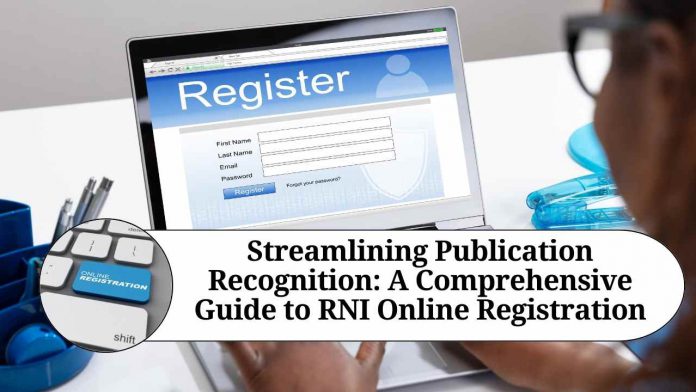Introduction:
In the digital era, where information is easily accessible through various mediums, publications continue to play a significant role in disseminating knowledge and ideas. Whether it’s a newspaper, magazine, or online news portal, registering your publication with the Registrar of Newspapers for India (RNI) is an essential step to ensure legal recognition and credibility. In recent years, RNI has introduced an online registration process, making it easier and more convenient for publishers to comply with the necessary requirements. In this blog post, we will explore the benefits and steps involved in the RNI online registration process.
Benefits of RNI Online Registration:
- Convenience: The RNI online registration process eliminates the need for physical paperwork and visits to the RNI office. Publishers can complete the registration from the comfort of their homes or offices, saving time and resources.
- Time Efficiency: With the traditional offline registration process, it could take weeks or even months for the registration to be completed. The online process significantly reduces this time, ensuring a quicker turnaround for publishers.
- Transparency: The online platform provides a transparent and streamlined system for publishers. They can track the progress of their registration application and receive updates on the status of their submission.
- Accuracy and Data Integrity: By using the online platform, publishers can enter their publication details directly into the system, reducing the chances of errors and ensuring accurate information. This helps maintain data integrity and minimizes the possibility of manual entry mistakes.
Steps for RNI Online Registration:
Step 1: Visit the RNI Website Access the official website of the Registrar of Newspapers for India (www.rni.gov.in). Look for the online registration section or portal on the website’s homepage.
Step 2: Create an Account If you don’t already have an account, create one by providing the necessary details such as name, email address, and contact information. Make sure to choose a strong password to protect your account.
Step 3: Fill in Publication Details After logging into your account, fill in the required information about your publication. This includes the publication title, language, periodicity, circulation, owner details, and editorial address. Provide accurate and up-to-date information to avoid any discrepancies.
Step 4: Upload Supporting Documents Prepare and upload the necessary supporting documents as per the guidelines provided. These may include a notarized affidavit, declaration of ownership, copies of the publication, and other relevant documents. Ensure that the documents meet the specified file format and size requirements.
Step 5: Pay the Registration Fees The online registration process requires payment of the registration fees. The fee structure varies based on factors such as periodicity, circulation, and the type of publication. Choose the appropriate fee category and make the payment using the available online payment options.
Step 6: Submit the Application Once all the details and documents are entered and the fees are paid, review the information provided. Verify that everything is accurate and complete, and then submit the application. Note down the acknowledgment number or take a screenshot for future reference.
Step 7: Track Application Status After submission, you can track the status of your application through your online account. The RNI portal will provide updates on the progress of your application, such as verification and approval.
Conclusion:
The introduction of the RNI online registration process has simplified and expedited the registration procedure for publishers in India. The convenience, time efficiency, transparency, and accuracy offered by the online platform make it an attractive option for publishers seeking legal recognition for their publications. By following the outlined steps and providing accurate information, publishers can ensure a smooth registration experience and focus on delivering quality content to their readers. Embrace the digital era and make the most of RNI’s online registration process for a hassle-free and compliant publishing journey.
Read more useful content:
Frequently Asked Questions (FAQs)
Q: Who is required to register with RNI?
A: Publishers of newspapers, magazines, and online news portals published in India are required to register with RNI.
Q: What are the benefits of RNI online registration?
A: RNI online registration offers benefits such as convenience, time efficiency, transparency, accuracy, and data integrity.
Q: How can I access the RNI online registration portal?
A: You can access the RNI online registration portal by visiting the official website of the Registrar of Newspapers for India (www.rni.gov.in).
Q: What documents are required for RNI online registration?
A: The required documents may include a notarized affidavit, declaration of ownership, copies of the publication, and other relevant documents specified by RNI.
Q: How do I pay the registration fees for RNI online registration?
A: You can pay the registration fees through the available online payment options provided on the RNI online registration portal.
Q: Can I track the status of my RNI online registration application?
A: Yes, you can track the status of your application by logging into your online account on the RNI portal. It provides updates on the progress of your application.
Q: How long does it take to complete the RNI online registration process?
A: The online registration process is designed to be quicker than the traditional offline process. The exact duration may vary but generally takes less time.
Q: What is the registration fee for RNI online registration?
A: The registration fee structure varies based on factors such as periodicity, circulation, and the type of publication. The specific fee category applicable to your publication will determine the fee.
Q: Can I edit my application after submission?
A: It is advisable to review your application carefully before submission. However, if any changes are required after submission, you may contact the RNI office for guidance.
Q: Is RNI online registration mandatory for all publications?
A: Yes, RNI registration is mandatory for newspapers, magazines, and online news portals published in India. It provides legal recognition and compliance with relevant regulations.




















